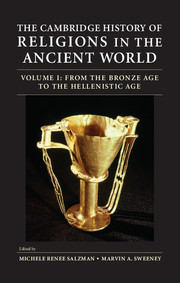Book contents
- Frontmatter
- Contents
- List of Figures and Maps
- List of Contributors
- List of Abbreviations
- Acknowledgments
- Introduction to Volumes I and II
- Introduction to Volume I
- Part I Mesopotamia and the Near East
- Part II Egypt and North Africa
- Part III Greece and the Eastern Mediterranean
- Part IV The Western Mediterranean and Europe
- 12 Etruscan Religion
- 13 Roman Religion through the Early Republic
- 14 Celtic Religion in Western and Central Europe
- Suggestions for Further Reading
- General Index
- Index of Citations
- Frontmatter
- Contents
- List of Figures and Maps
- List of Contributors
- List of Abbreviations
- Introduction to Volume II
- Part I Iran and the Near East
- Part II Egypt and North Africa
- Part III Greece and Asia Minor
- Part IV Italy, Roman Gaul, and Spain
- Suggestions for Further Reading
- General Index
- Index of Citations
- References
12 - Etruscan Religion
from Part IV - The Western Mediterranean and Europe
Published online by Cambridge University Press: 05 October 2013
- Frontmatter
- Contents
- List of Figures and Maps
- List of Contributors
- List of Abbreviations
- Acknowledgments
- Introduction to Volumes I and II
- Introduction to Volume I
- Part I Mesopotamia and the Near East
- Part II Egypt and North Africa
- Part III Greece and the Eastern Mediterranean
- Part IV The Western Mediterranean and Europe
- 12 Etruscan Religion
- 13 Roman Religion through the Early Republic
- 14 Celtic Religion in Western and Central Europe
- Suggestions for Further Reading
- General Index
- Index of Citations
- Frontmatter
- Contents
- List of Figures and Maps
- List of Contributors
- List of Abbreviations
- Introduction to Volume II
- Part I Iran and the Near East
- Part II Egypt and North Africa
- Part III Greece and Asia Minor
- Part IV Italy, Roman Gaul, and Spain
- Suggestions for Further Reading
- General Index
- Index of Citations
- References
Summary
Framework
The evidence for the study of Etruscan religion is fragmentary, much more than it is for Greek or Roman religion. Very little survives of original Etruscan writings on this subject. The most authoritative primary evidence comes from archaeological excavations in Etruscan sacred places, representations in art, and a few surviving texts in the Etruscan language ranging from circa fifty to thirteen hundred words, as well as some eleven thousand short inscriptions. After that come the numerous references in Greek and Latin authors, always to be read with appropriate caution as to time and place, and a few documents purporting to be translated from Etruscan into Latin or Greek. All of these sources must then be interpreted to seek a coherent picture.
Given these severe restrictions, it is still possible to use these sources to argue that the religion of the Etruscans should be studied as a system that had a profound connection with what they regarded as their sacred history. Key pieces of evidence indicate that both spoken and written words were controlling factors in formulating communication with the gods, and the result was that the Etruscans had a collection of books with an authority for them comparable to that of the Bible or the Q’uran, encompassing the origins of their religious practices, the pronouncements of their prophets, and a particular view of history as a record of the destiny of individuals, cities, and the Etruscan people as a whole.
- Type
- Chapter
- Information
- The Cambridge History of Religions in the Ancient World , pp. 309 - 335Publisher: Cambridge University PressPrint publication year: 2013
References
- 1
- Cited by



